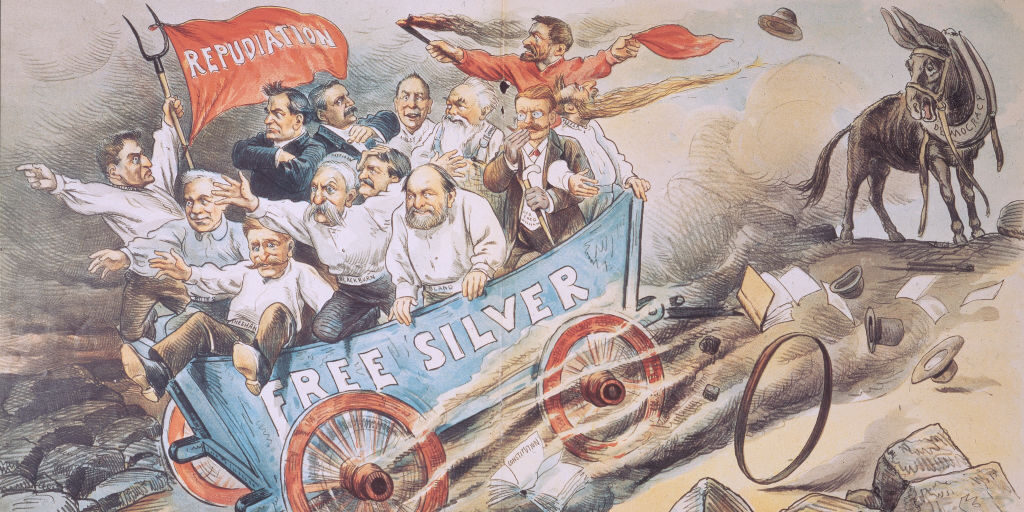Hamilton Craig at Compact agrees with my old friend and mentor Murray Rothbard that “political capitalism,” a system in which the government hands out favors to business interests, is not laissez-faire capitalism. “The biggest enemies of economic freedom were the capitalists who wielded state power for private advantage.” Well-off capitalists, Craig suggests, use libertarians as “ideological stooges.”
Rothbardians can only applaud this, but ideology is not so readily banished as Craig imagines.
He argues that the real struggle at the heart of history is between conflicting economic interests. “Neoliberalism” exploits those outside the favored few, and we must not let radical ideology, whether libertarian or leftist, distract us from the struggle for power. Devoting one’s energy to ideological battles plays into the hands of the neoliberal enemy:
libertarians and Marxists tend to believe that the others’ ideas have had a profound influence on the shape of Western political economy. In fact, neither idea has had any real influence on economic arrangements in the West, for the simple reason that these arrangements reflect interest, not ideology. It is critical for radicals of all stripes to recognize that the ruling interests of our society are non-ideological and thus not susceptible to ideological influence.
Craig opposes the neoliberals. How can we oust them? That is a good question, but in addition to asking it, we must also ask another. What arrangements do we want to replace those imposed on us by our exploiters? Craig does not tell us but instead insists that we must be guided by the struggle for power. Yet unless we have an answer to that second question, success in gaining power will achieve nothing. We will have thrown off our chains only to look around in bewilderment. What if what ensues is even worse than neoliberalism?
Looking at other articles Craig has written for Compact, it becomes evident where he is coming from. As a graduate student at City University of New York with an interest in farmers’ resistance to big business and banks, he writes with great sympathy about their struggles. In like fashion, he looks with favor on Andrew Jackson’s “populist” fight against Nicholas Biddle and the Bank of the United States.
But the farmers wanted an end to the “tight money” of the gold standard—think of William Jennings Bryan’s “cross of gold” speech—and for the most part they favored lunatic schemes of money and credit expansion. Jackson, by contrast, was a “hard money” man. Which of these views does Craig support, or does he have something else in mind? Without a carefully worked out economic theory, we will be lost. Rothbard did have such a theory, and in this way avoided the facile dismissal of ideology that beguiles Craig.
There is another area in which Craig goes too far with a valid point. He notes that the major institutions that give money to leftist ideas are using this support to add a gloss of legitimacy to their control of the economy. Those in charge of these institutions don’t sincerely care about these ideas, but support for them helps cement their control of the economy. (Yet don’t some of the elite really believe in “woke” programs?)
This argument hardly suffices to show the impotence of ideology. Businesses, even those that receive massive subventions from the state, respond to what their customers want. To the extent that proponents of “wokeism” are able to exert pressure by threatening boycotts or economic sanctions, they can make their ideas influential. When the pressure eases up, so does the money, as we can see in the vast fall-off of donations to Ibram X. Kendi’s quintessentially “woke” foundation. Precisely the point Craig stresses, that businesses want to maximize their power and wealth, does not show the impotence of ideology.
A related difficulty in Craig’s view of ideology has to do with what he says about Roger Milliken. He quotes Brian Doherty’s Radicals for Capitalism, which notes that the textile magnate Milliken favored high tariffs—“as un-libertarian a cause as one could imagine”—but also gave money to the “pacifist-anarchist Robert LeFevre.” Craig finds Milliken guilty of “perfect cynicism,” but this probably isn’t true. Those acquainted with Milliken thought he really did support LeFevre’s ideas. Why, then, did he also favor high tariffs? I do not know the answer, but there is a point of logic that Craig has missed. If you support A and B, but A and B are inconsistent, that does not show that you “really” favor one of the ideas but support the other cynically. People often hold inconsistent beliefs, though for the most part they avoid confronting the inconsistency.














